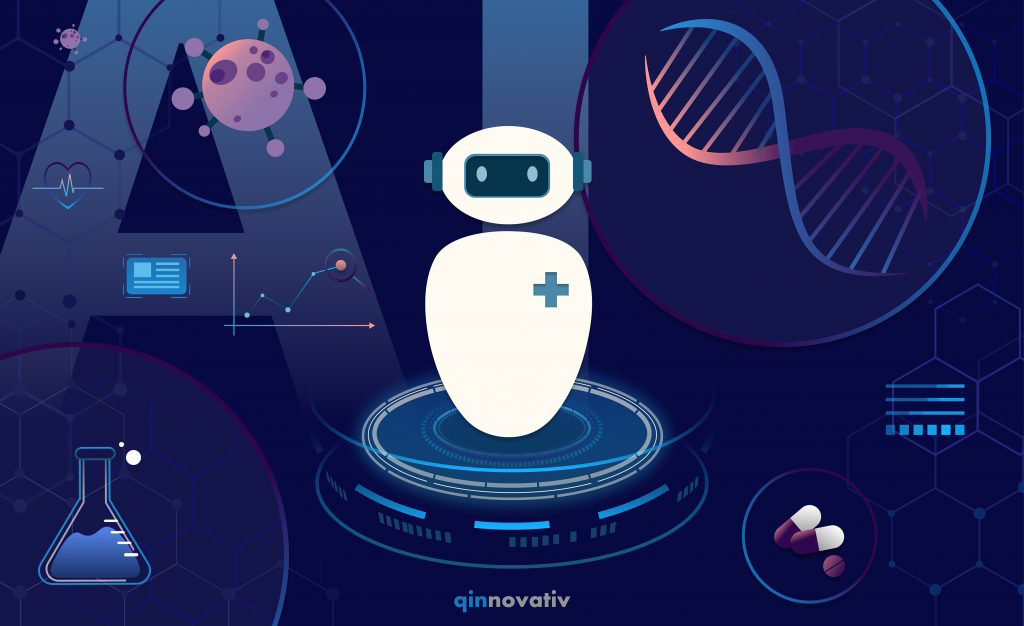
Text by Rebecca Sienel / Graphic by Jiao Jing
Artificial intelligence (AI) is an essential driver of the digital health revolution. Health research and care are already required application fields. At the moment, AI is mainly well developed in analysing medical images. But there are many more applications of AI technology out there that could contribute to advancement in healthcare.
Speed Up Disease Diagnosis
By analysing several thousand medical histories, computer programs can learn to predict courses of disease and therapy on an individual basis. Genetic analyses and image data can calculate the aggressiveness of a tumour and indicate whether radiation or chemotherapy is more promising. [1] AI systems will also optimise processes in the operating room. Surgeons performing sophisticated procedures under a microscope can use voice or gesture control to request information that appears in the eyepiece of the surgical microscope. [2]
Developing drugs faster
Artificial intelligence is also used in drug development. Here, it is intended to help make the analytical processes in drug development more efficient (and thus possibly also more cost-effective). AI is used in several steps. First, to develop a drug, the biological origin of the disease must be understood, and possible targets (primarily proteins) must be identified to enable appropriate treatment. AI systems are well suited to analyse all available data and find suitable target proteins quickly. The next step is to find a compound that can interact with the target molecule in the desired way. Therefore, a large number of potential compounds must be screened for affinity. A process that can take a very long time if done by humans. On the other hand, Computers can learn to predict the suitability of molecules based on structural data and then screen millions of potential molecules for this in a relatively short time. Artificial intelligence can also find biomarkers and even identify suitable test subjects. [3]
Personalised medicine and gene editing
Not all patients respond the same way to a drug, but which factors determine treatment success is challenging to figure out. AI-based systems can more quickly determine which patient might respond to which treatment based on the wealth of data from previous therapies.[4]
AI can also facilitate gene editing. The CRISPR-Cas9 genome editing system, in particular, represents a significant advance in editing DNA cost-effectively and precisely. The technique relies on so-called short guide RNAs (sgRNAs) to select and edit a specific site on DNA. But the guide RNA can match multiple DNA positions, leading to undesirable side effects. Therefore, careful selection of the guide RNA with the least dangerous side effects is one of the significant challenges in applying the CRISPR system. Proven machine learning models provide the best results here, which can significantly accelerate the development of guide RNAs for each section of human DNA.[5]
What AI could achieve in the future
It is still a dream of the future that AI could one day succeed in preventing diseases from arising in the first place. The idea would be software that analyses and correlates all of a person’s data, such as genetic predisposition, sporting activities, diet, social behaviour, and more, to identify specific risks and make appropriate recommendations. Likewise, artificial intelligence is not expected to replace doctors anytime soon. Nevertheless, the results of AI-based data analyses must be reviewed by a medical professional today and in the foreseeable future because even the most complex diagnostic systems are prone to error. Therefore, they must be subjected to the human gaze. [6]
Innovation agencies in the healthcare sector as support
However, if we want to reap the benefits and avoid the potential risk of AI technology, the clinical challenges need to be well understood to put the right AI tool in the right spot. Therefore, innovation agencies such as qinnovativ medtech are here to support understanding the value of AI in healthcare business and management. Please don’t hesitate to reach out to us for more insights about AI implementation in healthcare! contact@qinnovativ.de
Source:
[1] Elemento, O., Leslie, C., Lundin, J. et al. Artificial intelligence in cancer research, diagnosis and therapy. Nat Rev Cancer 21, 747–752 (2021). https://doi.org/10.1038/s41568-021-00399-1
[2] https://www.mobihealthnews.com/news/contributed-power-ai-surgery
[3] Paul D, Sanap G, Shenoy S, Kalyane D, Kalia K, Tekade RK. Artificial intelligence in drug discovery and development. Drug Discov Today. 2021;26(1):80-93. doi:10.1016/j.drudis.2020.10.010
[4] Schork NJ. Artificial Intelligence and Personalized Medicine. Cancer Treat Res. 2019;178:265-283. doi:10.1007/978-3-030-16391-4_11
[5] Gussow, A.B., Park, A.E., Borges, A.L. et al. Machine-learning approach expands the repertoire of anti-CRISPR protein families. Nat Commun 11, 3784 (2020). https://doi.org/10.1038/s41467-020-17652-0
[6] Davenport T, Kalakota R. The potential for artificial intelligence in healthcare. Future Healthc J. 2019;6(2):94-98. doi:10.7861/futurehosp.6-2-94

